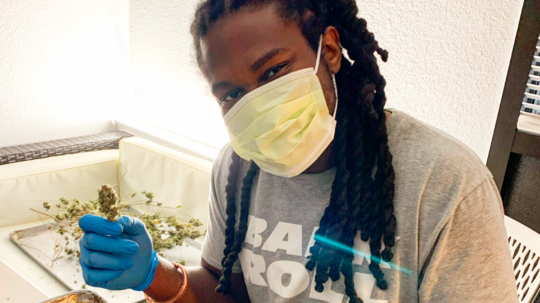
2020 was set to be a year of growth and new opportunities for Dallas-based cannabis industry gig work startup Kanna.
After launching last year, the company had been gaining traction and momentum in the industry and among the VC community. Kanna was accepted into the DivInc Fall 2019 cohort, the Capital Factory VIP accelerator program, as well as the 2019 MassChallenge Texas cohort. It was also selected as one of three winners of the Dallas SoGal Pitch Competition. And moving into the new year, co-founder and CEO Farhaj Mayan was working to figure out new pricing models and build relationships with cannabis farms for a planned expansion into Oklahoma – where cannabis is legal.
Then, in February, Mayan began hearing about the spread of coronavirus. By then, Kanna was beginning to add new customers and begin expanding operations in Oklahoma City.
“People started making a lot of noise and I was keeping an ear out,” he told NTX Inno. “Slowly, things started to escalate. For me, the real sobering moments were two things. One was when SXSW was speculating on canceling their conference; that highlighted the seriousness of the coronavirus. And the second was when Tom Hanks shared that he got coronavirus.”

Kanna was planning on sponsoring a conference at this year’s SXSW festival in Austin, an event which they ended up losing money on. Mayan said it was going to be almost like a “A coming out party to a really curated network of people.”
And, half-jokingly, Mayan said the Tom Hanks moment really did hit home, bringing to light the fact that this virus was something that was surely going to begin spreading beyond Asia.
“Seriously… it was an accelerant. I mean it happened and then a couple days later Oklahoma decided they were going to shelter in place,” Mayan said. “It was crazy. It was a little surreal. I sent out a couple emails and got on a few phone calls.”
Like many founders, when March came around and Covid-19 began spreading in the U.S., things took a turn for the worse. A new funding round the company was close to closing on was put on hold as the investor looked to help existing portfolio companies and, as Mayan puts it, “put out [their] fires.” However, they said they were still interested once things began to calm down.
The next hurdle came with Kanna’s gig workers. Through its platform, the company works to hire out temporary labor in the cultivation and harvesting of legal cannabis. But with the spread of the virus, they had to look for other ways to onboard new workers without traditional face-to-face interactions. In addition, there was the question of worker’s safety when placing them in positions.
“We thought growing the supply side of growing our business would be a challenge, but during an economic downturn people are looking for employment,” Mayan said. “The beautiful thing about this is being forced to pivot so fast helped us build more scalable processes into our existing operational funnel.”

Mayan said as things began to get serious, he sat down to make a Covid-19 thesis, looking at how quickly it could spread and the potential impacts on Kanna’s business. He said his predictions largely came true.
Initially, Kanna saw a downturn in business and it looked for ways to onboard workers and source PPE. However, working to Kanna’s benefit, cannabis was deemed an essential industry in Oklahoma. And with the help of friends at Houston-based 3D medical device printing startup Lazarus 3D, they were able to begin sourcing PPE for its workers. Mayan said that Kanna also began only working with cannabis farms that were putting CDC guidelines and other safety measures into effect.
And, in order to extend their runway, Kanna’s executive team decided to take a 15% pay cut.
“Cannabis, historically, is most tied to vice and medicine which tend to surge or perform pretty well during an economic downturn,” Mayan said. “People like to think of cannabis as natural medicine and they rely on that.”
And the company found that to be true. To begin onboarding new workers quickly and remotely, the company launched Kanna U, an online training program required for workers before going out in the field. Mayan said it was something they were thinking about doing that was accelerated by the pandemic. He said that within about two weeks of spending only about $60 on job board ads, Kanna had nearly 1,000 applicants. By early May, the company had onboarded about 500 new workers onto the platform through Kanna U. A week later, they had nearly doubled that.
Mayan credits the slight downturn in business with giving Kanna the time to reinvest in its product and to reinvest in its team.
“The decisions that I make are a lot more fast-tracked now and so I’m still playing long term games, but now I have to make decisions really fast,” Mayan said. “The goal has shifted from getting to XYZ milestones to getting to viability immediately, then building a path towards those milestones. I think we need to be conservative with our assumptions but aggressive with our approach. I think that’s the only way to survive in this landscape.”
After the initial downturn in business, Mayan said with back-to-back calls and a work week that seems to blend together, the stress of running a company had him not “feeling fully” himself.
"This sobering experience was exactly what we needed as a company."
“When everything was going downhill… I was kind of like, ‘okay this is on my shoulders now, I’m going to really focus on figuring this out.’ And then midway in… [our team was] like, ‘isn’t it now that we should be reaching out to our investors and advisor to help us navigate through this entire insane situation,’” Mayan said.
With the Covid-19 thesis he created, Mayan began reaching out to the network of investors, mentors and fellow founders he had created. He called it a “Hail Mary,” but the company began reaching out to current and potential investors and began hearing a lot of positive feedback.
Then a breath of air. In the last week, the company closed on a new funding round with the Cannabis Ancillary Fund in Oklahoma – giving Kanna runway through January as opposed to a looming July date. However, the details are currently undisclosed. Mayan said that when he told one of the team members, who was shopping at a Costco, they were screaming into the phone with excitement – as well as freaking out other customers.
The funding has also allowed the team to focus on their core product and platform. Kanna also recently hired a new front end engineer. For example, they recently gathered at Kanna HQ, a rented house near Oklahoma City, and after discussion decided to roll out an annual subscription model, which almost immediately landed them a new farm client.
“I think overall the team’s morale has increased significantly because we have a couple of things that are grounding us now, and we have more bandwidth to run experiments and fail and be happy about what we learned from those experiments,” Mayan said.
In addition to the network of business support, Mayan said he has been leaning on his team and friends to help with mental and emotional support. He said that Kanna has a culture of brutal honesty, something that has allowed the team to openly share thoughts, ideas and feelings even when working remotely. He said work meetings now typically entail discussion about plans for Kanna, as well as time to check in on each other.
“I think as a founder, having that open kind of communication with your stakeholders is great because they can get an idea of who you are and how you think in times of crisis or in times of great opportunity,” Mayan said. “I think it’s one thing that I had to come to terms with is that it’s okay to not be okay. Understanding that we're living in completely unexpected times and being disoriented is fine, as long as you're communicating.”
The Kanna team’s communication is aided by the fact that a number of its members work out of Kanna HQ. Initially, the house was a convenience as the company was attending the StitchCrew Accelerator at the Thunder Launchpad in Oklahoma City. Now, it serves as a home base, where the team can collaborate and have space for other team members to come and just enjoy company or a good meal – and Kanna has been hosting Kanna cookouts every Sunday with stakeholders in the cannabis community (abiding by the 10-person maximum requirement).
One would think living with coworkers could add extra strain to the business relationship. However, with one member being a former coordinator on a cruise line and with an established set of rules and chore duties, the house runs a tight ship. He said it has also helped them personally as the team there has started on the Keto diet and begun regular workout routines to stay healthy and productive during the pandemic. Also, Saturday and Sunday have been deemed “wellness day,” where there’s no work unless it’s mission critical.

“I realized starting a company with friends is really tough, like friends first who become business partners, but people who are business partners first and then friends, there’s a lot more aligned incentives,” Mayan said. “I think for the most part we’re all encouraging each other to get healthy habits and it’s awesome because we get to talk to each other every day. Each product decision, there’s more input and I think… it’s just saving us a lot of money and for the stage we’re in, it just makes a lot of sense.”
Virtual meetings are still the norm for Kanna. But Mayan said video conferences lack the energy and ability to be quirky. He said the team has quickly transitioned to constant online communication and collaboration. In addition, he said that through apps like Office Town (think Animal Crossing mixed with Zoom) and Lunchbox, he has been able to meet with founders, mentors and investors who normally wouldn’t physically be in the same room.
“This sobering experience was exactly what we needed as a company because we were gaining momentum way too fast and what it did is it slowed us down, made us think a lot about the different parts of our process and optimize them,” Mayan said.
While the future is still uncertain, Mayan said he is cautiously optimistic. Since unemployment has skyrocketed and many are looking for jobs, Kanna is looking to onboard more 1,500 to 2,000 gig workers over the next two quarters, as it’s in talks with more than 50 farms in Oklahoma. The company is also planning to add new courses to Kanna U with things like budtending and cannabis processing.
However, as states begin reopening, Mayan said he doesn’t see things going completely back to normal. He said while he misses the face-to-face interaction, things like renting offices for startups will likely slow down and founders will have to begin rethinking business models. He added that he is watching how states roll out increased testing.
Overall, Mayan said the pandemic forced the company to look at its model and focus on what really mattered. And through ups and downs that seem to change daily, it allowed Kanna to accelerate its product potentially years ahead, he said.
“It went from a land-and-expand to a survive-at-all-costs mentality,” Mayan said. “Now that we’ve done all that leg work… we can deploy that capital and be much more efficient and really hit our North Star metrics.”








